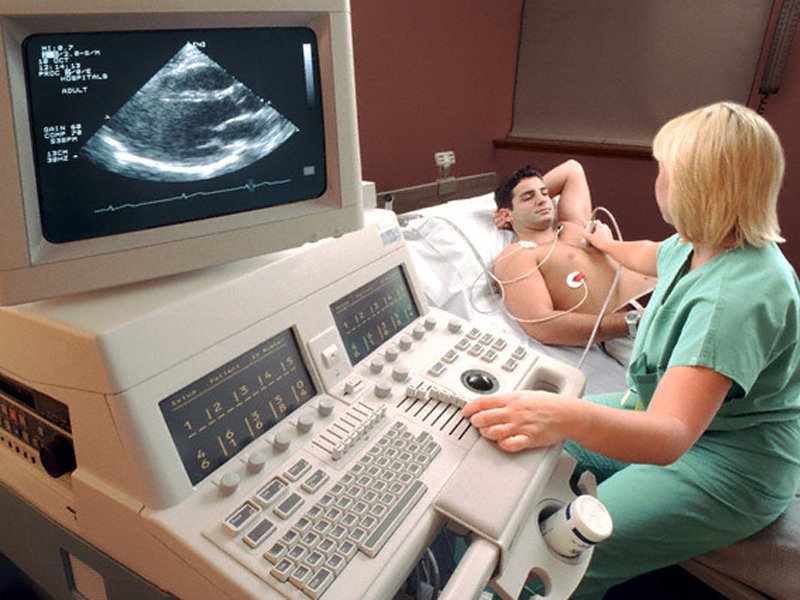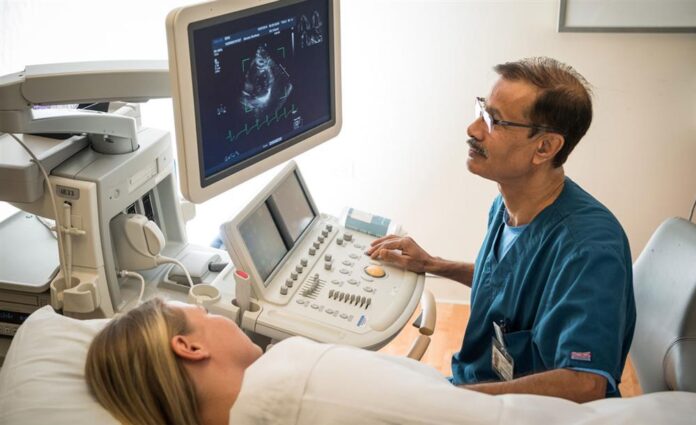Welcome to our blog series on heart health! Today, we will be delving into the world of echocardiography and how it can help maintain and monitor your heart’s well-being. Located in the beautiful suburb of Drummoyne, our team of expert cardiologists is dedicated to providing top-notch care for your heart. With state-of-the-art technology and years of experience, we aim to educate and empower our patients to take control of their heart health. So, let’s dive into the world of Echocardiography Drummoyne and discover its benefits.
Understanding Echocardiography: The Basics
Echocardiography is a valuable tool in the world of heart health. But what exactly is it? In simple terms, echocardiography is a non-invasive imaging technique that uses sound waves to create detailed images of your heart. By using a handheld device called a transducer, your cardiologist can capture real-time images of your heart’s structure and function.
During an echocardiogram, the transducer is placed on your chest and moved around to obtain different views of your heart. The sound waves emitted by the transducer bounce off the structures in your heart and create echoes. These echoes are then converted into images that your cardiologist can analyze.
One of the main benefits of echocardiography is its ability to provide valuable information about your heart’s health. It can help diagnose and monitor a variety of heart conditions, such as heart valve problems, heart failure, and abnormalities in the heart’s structure.
Echocardiography is also a safe procedure with no known risks or side effects. It is painless and can be performed in the comfort of your cardiologist’s office. The results are immediate, allowing your cardiologist to provide you with timely and accurate information about your heart health.
The Role of Echocardiography in Preventative Heart Care
When it comes to taking care of your heart, prevention is key. And that’s where echocardiography plays a crucial role. Echocardiography can help identify potential heart problems before they become serious, allowing for early intervention and preventive measures.
By using sound waves to create detailed images of your heart, echocardiography can provide valuable information about your heart’s structure and function. This information allows cardiologists to detect any abnormalities or early signs of heart disease. With this early detection, they can then develop a personalized plan to reduce your risk factors and improve your heart health.
Echocardiography is particularly beneficial for individuals with risk factors for heart disease, such as high blood pressure, high cholesterol, diabetes, or a family history of heart problems. It can also be used to monitor the effectiveness of treatments and interventions, ensuring that your heart health is continuously improving.
In addition to early detection, echocardiography also helps in assessing the progression of heart disease and guiding treatment decisions. By regularly monitoring your heart’s function with echocardiograms, your cardiologist can adjust your treatment plan as needed and ensure that you are receiving the most appropriate care.
 Cardiologists Drummoyne for Efficient Heart Assessment
Cardiologists Drummoyne for Efficient Heart Assessment
Our team of expert cardiologists in Drummoyne is dedicated to providing efficient heart assessments for our patients. With years of experience and a commitment to excellence, our cardiologists have the expertise and knowledge to assess your heart health with accuracy and precision.
When you come to our clinic, you can expect a thorough evaluation of your heart, including a comprehensive medical history review, physical examination, and advanced diagnostic tests, such as echocardiography. Our Cardiologists Drummoyne use state-of-the-art technology and advanced imaging techniques to assess the structure and function of your heart, allowing for early detection and intervention.
Efficient heart assessments are crucial for identifying any potential heart problems before they become serious. By detecting abnormalities or early signs of heart disease, our cardiologists can develop personalized treatment plans to reduce your risk factors and improve your heart health. Regular assessments also allow us to monitor the effectiveness of your treatment plan and make adjustments as needed.
At our clinic in Drummoyne, you can trust that you will receive efficient and comprehensive heart assessments from our skilled and dedicated cardiologists. Your heart health is our top priority, and we are committed to providing you with the best possible care.
Advanced Technologies for Accurate Heart Diagnosis
In the world of cardiology, accurate diagnosis is essential for effective treatment and management of heart conditions. That’s why advanced technologies have become invaluable tools in the field of heart health. In Drummoyne, our team of cardiologists is equipped with state-of-the-art technology to ensure accurate heart diagnosis.
One of the advanced technologies used in accurate heart diagnosis is 3D echocardiography. This innovative imaging technique provides a detailed and comprehensive view of the heart’s structure and function. By creating a three-dimensional image of the heart, cardiologists can assess its chambers, valves, and blood flow with greater precision.
Another advanced technology utilized in accurate heart diagnosis is strain imaging. This technique allows cardiologists to measure the deformation of the heart muscle, providing valuable information about its function. By analyzing the strain of the heart muscle, cardiologists can identify early signs of heart disease or abnormalities in the heart’s function.
Furthermore, computerized tomography (CT) scans and magnetic resonance imaging (MRI) are used to provide detailed images of the heart and surrounding blood vessels. These imaging techniques can detect plaque buildup, blood clots, and other abnormalities that may contribute to heart disease.
By combining these advanced technologies with the expertise of our cardiologists in Drummoyne, we can ensure accurate heart diagnosis. With accurate diagnosis, we can develop personalized treatment plans that are tailored to your specific needs. Rest assured that with our advanced technologies, your heart health is in the best hands possible.
How Echocardiography Improves Heart Health Monitoring
Echocardiography plays a crucial role in improving heart health monitoring. This non-invasive imaging technique provides detailed information about your heart’s structure and function, allowing your cardiologist to closely monitor your heart health and make informed decisions regarding your treatment plan.
One way echocardiography improves heart health monitoring is by providing real-time images of your heart. These images allow your cardiologist to assess the size, shape, and function of your heart chambers, as well as the movement of your heart valves. By monitoring these aspects, your cardiologist can detect any changes or abnormalities that may indicate the progression of heart disease.
Echocardiography also allows for the measurement of your heart’s ejection fraction, which is a key indicator of heart function. Your ejection fraction measures the percentage of blood pumped out of your heart with each heartbeat. By tracking changes in your ejection fraction over time, your cardiologist can evaluate the effectiveness of your treatment plan and make adjustments as necessary.
Furthermore, echocardiography can detect the presence of blood clots or abnormalities in your heart’s blood flow. These findings can help your cardiologist identify potential complications or risks, allowing for timely intervention to prevent further damage.
Echocardiography’s Role in Detecting Heart Disease
Echocardiography plays a crucial role in detecting heart disease and assessing its severity. By using sound waves to create detailed images of your heart, echocardiography provides valuable information about the structure and function of your heart. This information allows cardiologists to identify any abnormalities or signs of heart disease.
One of the main ways echocardiography helps in detecting heart disease is by evaluating the movement of your heart valves. It can detect if your valves are not opening or closing properly, which may indicate a heart valve disease. Echocardiography also helps in detecting any issues with the size and shape of your heart chambers, as well as the thickness of your heart walls. These findings can indicate conditions such as heart failure, enlarged heart, or cardiomyopathy.
Echocardiography also allows cardiologists to assess your heart’s blood flow. It can detect the presence of blood clots, narrowed or blocked blood vessels, or abnormalities in your heart’s blood flow. These findings are crucial in identifying potential complications or risks, allowing for timely intervention to prevent further damage.
FAQs
Have some questions about echocardiography? Don’t worry; we’ve got you covered! Here are some frequently asked questions to help you understand this valuable tool for maintaining and monitoring your heart health.
Q: Is Echocardiography Drummoyne a painful procedure?
A: No, echocardiography is a painless procedure. It is non-invasive and does not involve any needles or incisions. The transducer used during the procedure is placed on your chest and moved around to obtain different views of your heart.
Q: How long does an echocardiogram take?
A: The duration of an echocardiogram can vary, but on average, it takes about 30 minutes to an hour. It includes the time for preparation, the actual procedure, and any necessary measurements or assessments.
Q: Are there any risks or side effects associated with echocardiography?
A: No, echocardiography is considered a safe procedure with no known risks or side effects. It uses sound waves to create images of your heart and does not involve any exposure to radiation.
Q: Do I need to prepare for an echocardiogram?
A: In most cases, there is no special preparation required for an echocardiogram. However, your cardiologist may give you specific instructions depending on your circumstances.
Q: Can echocardiography be used to monitor the effectiveness of my heart medications?
A: Yes, echocardiography can be used to monitor the effectiveness of heart medications. It can provide valuable information about your heart’s function and help your cardiologist evaluate how well your medications are working.
Conclusion
In this blog post, we explored the world of echocardiography and its role in maintaining and monitoring heart health. Echocardiography is a non-invasive imaging technique that provides valuable information about the structure and function of the heart. It can detect early signs of heart disease, assess the effectiveness of treatments, and monitor the progression of heart conditions. With advanced technologies and skilled cardiologists in Drummoyne, you can receive efficient and comprehensive heart assessments. By utilizing echocardiography, you can take control of your heart health and ensure timely interventions for optimal well-being.
| Other Good Articles to Read |
| Blogs Rain |
| Cme Blog Spot |
| Garcias Blogs |
| Yyc Blogs |
| Blogs-Hunt |
| Impact-Blog |
| Smarty Blogs |
| Ed Blog |
| Mo Blogs |
| Blogs Em |
| Blogs T |
